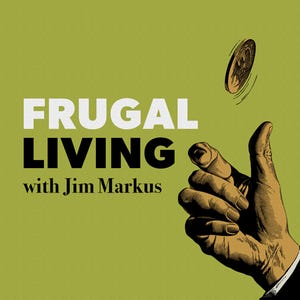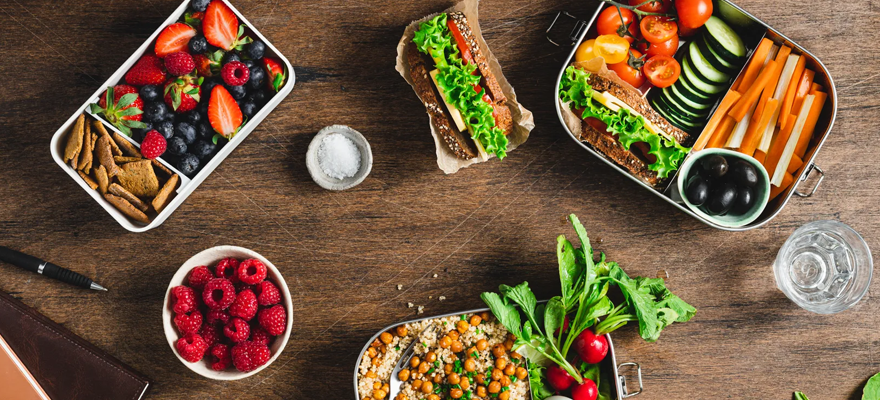Frugal Living: How to Meal Prep like an Expert
How do you save money and stay healthy? We talked with Kara, the dietitian from Cheesy Nutrition, about real-world ways to prep frugal meals.
Every week on Frugal Living, we explore what it means to get more out of life—even when you spend less. That's why we wanted to talk about cooking at home. Food prices went up this year, and inflation isn't going away anytime soon. So how do you save money and stay healthy?
We talked with Kara, the dietitian from Cheesy Nutrition, about the smart way to plan your meals. Looking for Jim's recipes? We have some of them featured on @frugallivingpod on TikTok.
Where to listen to Frugal Living
You can listen to our episode, How to Meal Prep Like an Expert, with any of the following services. Here's where you can listen online or download the episode for free:
Prefer to read this conversation? We have a partial transcript of the conversation below.
Meal Prep Like an Expert: Transcript
Jim: This is Frugal Living.
How do you save money and stay healthy? Today's interview highlights the expertise from Kara, the dietician from Cheesy Nutrition. She might just change the way you think about meal planning. That's what it did for me.
After our conversation, my daughter was born. And I used that time between those two events to prep using a lot of the things that Kara and I talk about in this show. It changed everything <laugh> about my first two weeks with my daughter. I didn't have to spend any time cooking in the kitchen. I already had meals prepared, so it was just warming stuff up and then eating good, healthy food that I prepped a month or so earlier. All of that came from this conversation that I had with Kara. I hope you get as much from it as I did. And really I'm delighted to share it. Here it is.

Listen to Frugal Living
Kara: I'm Kara and I'm the cheesiest dietician you might ever meet. And I love helping people learn the best way to plan and prep their meals.
Jim: Before we get into how you got into this, can you tell me a little bit about kitchen prep and meal prep?
Kara: Yeah. So my big thing is that people have this idea of what meal planning or meal prep is. And it's, I mean, it's based on media. It's based on, you know, no offense, but podcasts. It's based on Pinterest. It's based on Instagram and this kind of unnatural setting in a sense. And so what I bring to the table is we're looking at meal planning and meal prep as it's individual.
It's just like nutrition, which is my background. It's just like how everybody's nutrient needs are different. Your meal planning and meal prep, adventure really will, will be different than everybody else's. It might be similar in some ways, but in other ways it's gonna be different. And so when it comes to planning and prep, you gotta take it off this pedestal <laugh> and just bring it back down to start exactly where you are and build from there. And it will change over time.
Jim: I like that. It seems very realistic. And it sounds like the place you're coming from is, I'm imagining Pinterest videos and Instagram videos of people with fully stocked, flawless-looking freezers that are just, this would take me three weeks to put together this amount of food <laugh> and they seem to have it all labeled. Is that kinda what you mean where we're coming from?
Kara: Yeah, that is the pedestal. I mean, sure. It looks great, but it works for some people. I don't think that works for the masses. Even when it was just my husband and I, that didn't work for us. Do I prepackage some things like our lunches? Yes. But it doesn't look like, you know, this perfect image <laugh> of what most people think of when they think of meal prep,
Jim: What does it look like? What is the, the real version of this?
Kara: So again, it's different for everybody, but what we actually do is something that's worked for us for years. And now that our little guy is getting a little bit more into food it still works right now. We'll see if that lasts. But in general, every week I end up prepping three different meals for dinners, one meal for lunches, becuase we, we don't care and one type of breakfast. So, you know, we have different fruits.
We have different veggies. We have sometimes different side, but in general I'm making that so one breakfast, one lunch, three dinners that works for us. Some people that I work with are like, no, that's gross. I, I need a different lunch every day and that's fine. So I help them work through that without it being overwhelming.
Jim: Perfect. And you're coming at this with kind of a science background. You've studied nutrition.
Kara: <Laugh> A lot. Yes <laugh>. Yeah. I don't think a lot of people realize what it takes to be a dietician. And there's a big difference between a dietician and somebody who just considers themselves a nutritionist. So a nutritionist can do, I mean, as little as like a one day class online, print themselves a certificate and be like, "Hey Instagram, I'm your nutrition person". And I'm not saying every nutritionist is like that at all.
There are plenty who go through a lot of schooling, a lot of education, but you know, there's a big divide, in a sense, in education requirements for those two terms. And so I am a dietician. So I have done at least the minimum. You can expect that. With the bachelor's in a dietetics program, I've done the supervised practice, which is kind of like a residency, and then there's a national board exam.
Kara: And then there's state licensure requirements that you have to do on top of that. So I have a lot of science background and a master's on top of all that. I'm coming at you not only to help with meal planning and meal prep, but how to incorporate health and that because when we're talking about saving money, sure.
It's great right now to save money on food when you're at the grocery store, especially right now, it's terrible, but in general we have to think long term. So we might save 20 bucks this week, 20 bucks next week. And that feels great. But when you get to be 40, 50, 60, and you're racking up all these medical conditions, that's where that extra cost savings can come in with meal planning with health in mind.
Jim: I love that way of looking at things. When you think of long term health benefits, insurance and health costs are astronomical. And it's one of the hardest questions to answer. When someone says, you know, Jim, you're a frugal person, "How do I save money on health insurance?" You're not gonna like the answer. This. This is how you do it. <Laugh> You eat well, you exercise and it's years and years rather than when you want it most.
Kara: Yeah, it's not so much like let me pull different quotes and pick the best one. I mean, it's the same with meal planning. And that's also why I say it changes over time because as we age things change, and unfortunately we usually need fewer calories every year, you know, <laugh>. And so as we age, we might not need as much. And as our family grows or kids go off to college, we've gotta kind of adjust what we're doing. And so having the skills to plan and prep and knowing that there are alternative ways of doing so can really help you long term.
Jim: You talk about the pedestal of meal prep as you know, kind of this, this flawless, pristine thing. When I think of the pedestal of frugal food, I think of people stocking up on lentils and ramen and that's it <laugh> and I cry and I die a little inside. Can you, can you tell me a little bit more of a, what's a better way for someone with a frugal mindset to make the most of their meal prep?
Kara: I had to laugh because I thought you were going somewhere great with the lentils and then you threw in wrong. Oh
Jim: No, I, I was like, I'm with you. I love lentils. It's just, that's kind of the community staple. That's our food. <laugh>
Kara: <Laugh> Yeah. So there are tons of lower cost, healthier foods. And actually to be honest, I really hate labeling things as healthy or unhealthy it's, you know, there's so much gray area nutrition, what's healthy for one person isn't healthy necessarily for another too much of a healthy food might be unhealthy. You know, so healthy is a bad word in my opinion, for me to use.
So I'm not gonna try to use it too much, but when it comes to trying to make budget friendly choices, one of the best ways, it it's gonna sound kind of weird, but it's really just planning because if you have a plan, you know what you need, you know what you use regularly, you can stop up, stock up, not stop up <laugh> we don't wanna stop up lentils, help with that.
Jim: <Laugh>
Kara: But if we're going to be stocking up on our staple foods, cuz we know what those are and we're choosing things that might be a little bit better for us. We can really, really, really try to do that when they're at their lowest price point. So I mean, pandemic hit a couple years ago in case you didn't know. I just wanted to let you know. So the food prices have steadily been going up, right?
Even things that were typically really low cost, like our dried beans and our dried grains, even lentils, you know, those things have continued to go up and up and up and our paycheck doesn't necessarily go up and up and up with it. So really keeping an eye on sales, really keeping an eye on what is actually a sale versus just fancy marketing is a, is a big thing when it comes to meal prep and planning, because in all honesty, some things, if you look at an ad, make it look like it's really on sale, but really they're just highlighting a product
Jim: I'm with you there. Yeah. Keeping track of like historical prices is key. Mm-Hmm <affirmative> not just in food, but in everything.
Kara: <Laugh>. Yeah. And it can seem really overwhelming when you're like, well, I don't wanna track all this. You don't have to, you just pick some of your main staples, you know? So at our house we use a lot of canned tomatoes and we use a lot of brown rice and we use a lot of dried beans. So I know what those cost oh and flour. Oh my gosh, we buy, oh sure.
Jim: Flour.
Kara: <Laugh> we make, we make all of our own bread and I've gotten to sourdough in the last few months, almost a year now. So I definitely buy a lot of flour.
Jim : I understand. Yeah. That's I mean a good, good investment. That was also hard to get though in a lot of places at the start of the pandemic.
Kara: Yeah. It was. And thankfully we've always been buying it, you know, when it goes real cheap. So we had a good bit to make it through, but where we really lost out was the yeast and I wasn't into sourdough at that point. So it was like, oh no, what are we gonna do for bread? We haven't bought store store bought bread in like two, three years.
Join the Frugal Living Community
Want to join the Frugal Living podcast community? You can find us on social media: TikTok and Instagram. Find the full show notes, including a transcript of the show, at Frugal.fm. This episode's sponsor is Highlights, where you can use the promo code FRUGAL15 for an extra 15% discount.

